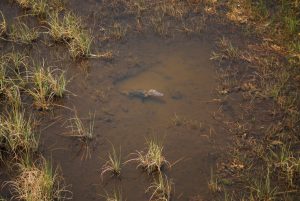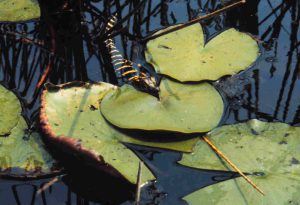American alligators are one of the largest beneficial predators that have stood the test of time balancing ecosystems.
Yet, they’re largely misunderstood.
“Often sensationalized, these iconic reptiles are recognized by biologists and ecologists as indicators of ecosystem health that can signal environmental changes,” said Venetia Briggs-Gonzalez, a senior research biologist at the UF/IFAS Fort Lauderdale Research and Education Center (FLREC) and a member of The Croc Docs.
American alligators are found across the Southern United States, drawing attention throughout the year. In Florida, the Everglades, freshwater lakes, marshes, swamps, rivers and canals teem with alligators.
On May 29, National Alligator Day, heightens the need for species awareness. It is no wonder American alligators are the official state reptile of Florida, Louisiana and Mississippi.
“As humans, we enjoy a love-and-fear relationship with American alligators because they symbolize strength and survival, among other desirable qualities,” said Sergio Balaguera-Reina, a research scientist at FLREC and member of The Croc Docs. “We celebrate and raise awareness of these modern-day archosaurs because of their critical roles and the need for continued conservation efforts.”
The Croc Docs offer these five key insights on what American alligators tell us and why we should appreciate them:
-

Alligators make holes in ponds to retain water providing a home for other aquatic species and food for predators such as large fish, wading birds, otters and alligators. Alligators are ecosystem engineers.
They dig holes, making ponds in marshes that retain water as the surrounding marsh dries out. “This behavior provides a home for other aquatic species and food for predators such as large fish, wading birds, otters and alligators,” said Frank Mazzotti, professor of wildlife ecology at FLREC who leads The Croc Docs.
- Alligators are not doing well in the Everglades.
Human interference and water management practices designed to support a growing human population have created habitat loss and altered wetland quality. “This has had a direct impact on alligator populations. Research tells us that American alligators in Florida are growing slower, surviving less and have reduced their reproductive output in areas of disturbance,” said Balaguera-Reina.
- Alligators are good indicators for Everglades’ restoration.
Because alligators are doing so poorly in the Everglades, we expect them to respond positively to ecosystem restoration informing us of restoration progress. Alligators are sensitive and resilient.

- Alligators are part of an invasive species predatory cycle.
Alligators can prey on invasive species but are sometimes preyed upon by Burmese pythons. Their ability to control invasive species will depend upon populations sizes and colocation.
- Gators are smart and curious.
Did you know that alligators are less aggressive than many other species of crocodylians? Their ability to remember things like sources of food is surprisingly well-developed. If they see movement in the water, they will approach the source simply because they are curious. Always respect their space.
###
By Lourdes Mederos, rodriguezl@ufl.edu
Para accesar a esta comunicación en español, por favor utilice este enlace
ABOUT UF/IFAS
The mission of the University of Florida Institute of Food and Agricultural Sciences (UF/IFAS) is to develop knowledge relevant to agricultural, human and natural resources and to make that knowledge available to sustain and enhance the quality of human life. With more than a dozen research facilities, 67 county Extension offices, and award-winning students and faculty in the UF College of Agricultural and Life Sciences, UF/IFAS brings science-based solutions to the state’s agricultural and natural resources industries, and all Florida residents.
 2
2
